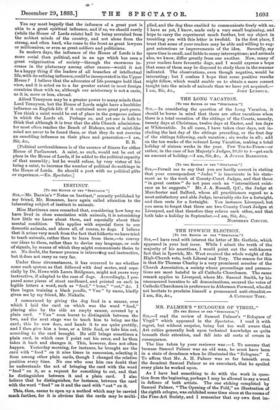INSTINCT.
[To THE EDITOR OF THE "SPECTATOR."] Stn,2-Mr. Darwin's "Notes on Instinct," recently-published by my friend, Mr. Romanes, have again called attention to the interesting subject of instinct in animals.
Miss Martineau once remarked that, considering how long we have lived in close association with animals, it is astonishing how little we know about them, and especially about their mental condition. This applies with especial force to our domestic animals, and above all, of course, to dogs. I believe that it arises very much from the fact that hitherto we have tried to teach animals, rather than to learn from them,—to convey our ideas to them, rather than to devise any language, or code -of signals, by means of which they might communicate theirs to us. No doubt, the former process is interesting and instructive, but it does not carry us very far.
Under these circumstances, it has occurred to me whether some such system as that followed with deaf mutes, and cape- -daily by Dr. Howe with Laura Bridgman, might not prove very instructive, if adapted to the case of dogs. Accordingly, I pre- pared some pieces of stout cardboard, and printed on each in legible letters a word, such as " food," " bone," "out," &c. I -then began training a black poodle, " Van" by name, kindly given me by my friend, Mr. Nickalls.
I commenced by giving the dog food in a saucer, over which I laid the card on which was the word " food," placing also by the side an empty saucer, covered by a plain card. " Van " soon learnt to distinguish between the two, and the next stage was to teach him to bring me the card ; this he now does, and hands it to me quite prettily, and I then give him a bone, or a little food, or take him out, according to the card brought. He still brings sometimes a plain card, in which case I point out his error, and he then takes it back and changes it. This, however, does not often happen. Yesterday morning, for instance, he brought me the .card with " food " on it nine times in succession, selecting it from among other plain cards, though I changed the relative position every time. No one who sees him can doubt that he understands the act of bringing the card with the word "food" on it, as a request for something to eat, and that he distinguishes between it and a plain card. I also believe that he distinguishes, for instance, between the card with the word " food" on it and the card with " out " on it.
This, then, seems to open up a method which may be carried mach further, for it is obvious that the cards may be multi-
plied, and the dog thus enabled to communicate freely with us.- I have as yet, I know, made only a very small beginning, and hope to carry the experiment much further, but my object in troubling you with this letter is twofold. In the first place, I trust that some of your readers may be able and willing to sug- gest extensions or improvements of the idea. Secondly, my spare time is small, and liable to many interruptions; and animals also, we know, differ greatly from one another. Now, many of your readers have favourite dogs, and I would express a hope that some of them may be disposed to study them in the manner indicated. The observations, even though negative, would be interesting; but I confess I hope that some positive results might follow, which would enable us to obtain a more correct insight into the minds of animals than we have yet acquired.—


































 Previous page
Previous page